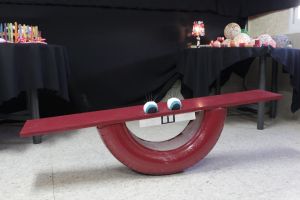
Environmental Unit Exhibition of Recycled Materials
Environmental Unit Exhibition of Recycled Materials The environment unit at Lajee Center along with the people of Aida Camp are
Aida and Al Azza Refugee Camps (~8500 people), which are adjacent to Bethlehem, are densely populated areas comprised of refugees from more than thirty-five villages throughout occupied Palestine. Currently, UNRWA is delivering basic services catering for the health, education and environmental needs of the community. Often these services do not meet the needs of and are not governed by the refugees, but rather outside governments and organizations. This of course is an insufficient model for funding such crucial services for people’s basic needs. Lajee Center created different projects in order to bridge this gap in UNRWA services and empower the local community. These projects work with one another, with the ultimate goal to maximize wellness within the community, via social cohesion and creative integration with existing environment and health care facilities. Our mission is creating a model of community workers, globally proven and locally generated.
Community Health Workers:
The Community Health project is designed to provide social accompaniment, transportation facilitation, medication supervision and supply oversight, basic vital sign and glucose monitoring, psychological first aid, and additional trauma-informed psychosocial counseling, resilience promotion, and supportive referrals to clinical services when appropriate. Community health workers not only help prevent heart attacks, strokes, heart failure, and premature death associated with chronic diseases. They also contribute to community cohesion and resilience. Community health workers perform their functions in mixed gender pairs based on community preference, and are supervised by a coordinator, and medical director, who liaise with local clinics and hospitals. Each pair of the current 7 community health workers, 6 CHWs are full time and 1 is part time, visit nearly 150 patients according to the levels, level 1 visit them four days in a week, level 2 visit them twice a month, and level 3 visit them once in a month. Plans are underway for the development of a project-specific Health phone app called Kobo toolbox that used for monitoring, evaluation, and data collection.
Lajee’s Environment Unit and Water Project:
The Environment project at Lajee Center seeks to preserve the land and to revive Palestinian historical connections to agriculture, while at the same time targeting specific issues such as water management, food security and sustainable management of waste products. These programs support the aims of the community health project by developing the health services that are interlinked with environmental issues, while expanding opportunities for young refugees to learn how to identify and solve environmental problems in Palestine. Environmental workers will offer workshops on how to grow and eat healthy foods and the importance of clean water. Volunteers and local youths have been an integral part of the project since the beginning, and members of the community have taken part in every step of the process. The project also shows the camp’s residents how the rooftop gardens can function so that they can build their own gardens and develop a network of rooftop gardens that could serve as a model for refugee camps across the region, increasing Palestinians’ control over their food sources, especially organic fruits and vegetables.
The main environmental challenges facing the residents of Aida and al-Azza camps are:
Impure water supply contaminated by chemical and mineral toxins in the groundwater
· Inadequate, unreliable and unsanitary water storage and distribution characterized by frequent shortages and high bacterial counts, particularly in water coming from storage tanks.
· Contamination by tear gas and other military assault material perpetrated by the occupying forces
· Accumulation of garbage and open drainage encouraging vermin and vector borne disease.
· Poor air quality compromising the health of vulnerable residents such as the very young, the elderly and those with pulmonary conditions.
The Water project was started by John Durant’s graduate class at Tufts University in the U.S. The project aims to assess water quality in the camp and develop a water quality monitoring program that is operated by the local community, so that the residents of Aida Camp have access to sufficient, safe and acceptable quality water for personal and domestic use. During the first phase of the project, Lajee Center’s staff, as well as groups of women and students from Aida Camp, were trained in sampling and analysis procedures and worked on the water quality testing program. Every year a delegation of graduate students from Tufts University has come to work on issues related to water quality in Aida Camp.
This collaboration has supported Lajee’s work in water testing and a growing environmental unit. Lajee Center’s annual International Summer Camp, selling of publications and other independent donations also support our work.
The Hydroponic Unit:
Recently, we have three greenhouses includes many systems depending in water, two of the houses in the rooftop of lajee, and one of them in the patient of the health unit rooftop, helping people to depend on them self to get their food.
Food Security and Recycling:
Activities related to food security include education on and employing in small-scale agricultural initiatives within Bethlehem and the surrounding areas. There will be a specific focus on the food security that rooftop gardens can provide to the community. Activities related to recycling include education on composting and the benefits of recycling organic and inorganic materials including items found in overabundance in Palestine such as wood, paper, tires, and bottles by doing environmental camps.
Environmental Unit Exhibition of Recycled Materials The environment unit at Lajee Center along with the people of Aida Camp are
Community health workers raising awareness of breast cancer Worldwide, October is considered as the month of awareness of breast cancer.
Health for Palestine team keeps supporting the Aida and Al-Azza community Over the last months, lajee’s health team continued accustoming

